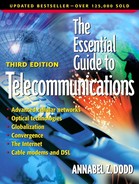Chapter 3. The Bell System and Regulatory Affairs
In this chapter...
The Bell System Prior to and after 1984
Local Competition Prior to the Telecommunications Act of 1996
Factors Leading to Passage of the Telecommunications Act of 1996
The Telecommunications Act of 1996
Post Telecommunications Act of 1996 Developments
Impact of the Telecommunications Act of 1996
Appendix
The regulatory events now occurring in the rest of the world mirror past events in the United States. The following events, which took place in the United States starting in 1984, reflect what is happening across the world as other countries deregulate to promote investments in telecommunications:
Elimination of artificially high long distance prices that subsidize local rates and make local telephone service available at lower costs to the residents
Deregulation of the long distance markets, opening them to competition
Regulations that divest local telephone companies from ownership by long distance companies
Requirements that incumbent local telephone companies allow competitors to connect to their facilities at reasonable rates in a timely manner
The 1984 divestiture separated AT&T and the local Bell Operating Companies (BOCs) into separate organizations. This was done to ensure that the local telephone companies provided the same quality connections to AT&T's competitors, other interexchange carriers, as it gave AT&T. These connections were necessary to transport calls between long distance networks and local homes and businesses. This separation spurred competition in long distance services.
Seven Regional Bell Operating Companies (RBOCs) were created at the 1984 divestiture. The RBOCs were made up of AT&T's 22 former local Bell Operating Companies. Following passage of the Telecommunications Act of 1996, the seven RBOCs decreased in number to four. Interexchange carrier Qwest purchased U S West and all the others except BellSouth merged. In addition, SBC and Verizon each purchased large independent incumbent telephone companies. Verizon bought the largest independent telephone company, GTE, and SBC bought Southern New England Telecommunications (SNET). SNET is the incumbent telephone company in Connecticut. (Independent phone companies are incumbent telephone companies not previously owned by the Bell system.)
Local competition in telecommunications emerged in the 1980s. Competitive access providers (CAPs) initially provided fiber optic links between customers in major metropolitan areas and interstate long distance providers. The purpose of these links was to connect long distance vendors to local customers without the hefty access fees charged by local telephone companies to long distance carriers. Having fiber optic links in place in major metropolitan areas has enabled CAPs to expand their offerings. They became competitive local exchange carriers (CLECs) and started offering additional services leveraging their investment in fiber optic cabling.
CLECs sell data services, Internet access and local toll calling to business and residential customers, although most of their sales are to business customers in urban areas. Competitive local exchange carriers route calls over a mix of their own fiber optic and wireless facilities as well as over facilities they buy at a discount from local telecommunications companies. They have, in essence, become a combination of local exchange carrier (LEC), interexchange exchange carrier, data communications vendor and Internet access providers.
The Telecommunications Act of 1996 allows telephone carriers, utilities and cable TV companies to sell both local and long distance calling. It also deregulates cable television. Prior to the Act, in most states, interexchange carriers (IEXs) such as AT&T, WorldCom and Sprint were allowed to sell only long distance services, and local telephone companies were restricted to local services. When Congress passed the Telecommunications Act, many legislators thought competition would promote development of new high-speed services. Long distance carriers lobbied for the Act in hopes of expanding sales of local services. Bell telephone companies lobbied for passage of the Act as a way to offer long distance and data services on an interstate basis. In contrast to divestiture, the Telecommunications Act of 1996 did not mandate that the local telephone companies form separate companies to supply connections to the very companies formed to compete with them. This has been a major factor inhibiting competition for local service.
In the years following passage of the Act, the Regional Bell Operating Companies challenged its legality in the courts. The courts denied the validity of these challenges. However, economic conditions and incumbents' delays in processing competitors' requests for services proved more effective in the battle for dominance in local services. Competitors have made the largest inroads by selling service to business customers in large cities. For the most part, the only viable alternative for residential local telephone service is from cable TV providers.
